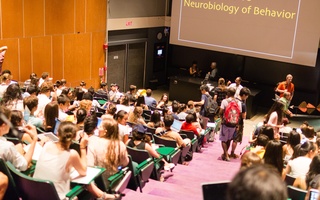{shortcode-cbbc38bdc7502111b95a60aff0faca7c380b85e7}
This is part III in a three-part series. Part I ran in The Crimson’s Commencement Year in Review issue last May and was reprinted on April 28. Part II ran on April 29.
When Karina A. Partovi ’14-’15 looks out the window of her Eliot dorm room at the Anderson Memorial Bridge, all she sees is a bridge.
She looks out at the stone ledge perched above the rushing waters of the Charles without thinking back to that November night more than three years ago when she sat on that ledge, stared into those waters, and prepared to take her own life.
“It’s just there now,” Partovi said. “It’s not an enemy.”
After contemplating suicide, Partovi took a leave of absence from Harvard and returned to her home in San Diego, where she saw a therapist, worked at a local elementary school, and spent time with her family.
Now, she’s back on campus, once again thrust into the fast-paced life of a Harvard undergraduate.
Partovi is not alone. Students who have gone home for mental health reasons say they came back to Harvard with a new approach to addressing the difficulties of campus life, better equipped to make the most of their Harvard experiences. After spending time divorced from the University for mental health reasons—striving to heal and demonstrating their stability to Harvard—students are excited to return to campus, ready to take on the challenges of an undergraduate once more.
‘YOU’RE COMING BACK’
When Partovi came down from the edge of the Anderson bridge after her suicidal thoughts had subsided, her freshman resident dean gave her a choice.
“My options were—and I don’t mean to sound ungrateful—my options were: you can either leave willingly or be forced out,” Partovi said. “But [then-Ivy Yard Resident Dean William Cooper ’94] also made clear, which I didn’t appreciate it at the time because I was angry and hurt and very very scared and overwhelmed, he did say that we’re not kicking you out forever, you’re coming back, you just shouldn’t be here right now.”
Partovi, choosing to not mar her record with a forced withdrawal, elected instead to take a leave of absence. Cooper escorted her back to her dorm, supervised her as she packed, and ensured that she was off campus the next day. Cooper, who has since departed the position and now works as associate dean of student life at the College, declined to comment for this story.
Now, more than three years after the night on the bridge, Partovi is once again eating in dining halls, sitting in lectures, and otherwise being a student at Harvard. But unlike most students, she and others who took time off for mental health reasons undergo an extensive process to demonstrate that their mental health—and not merely their personal or academic achievements—will allow them to thrive at Harvard.
Usually after a student takes a leave of absence, University Health Services sets guidelines to facilitate his or her successful return. Those guidelines instruct students to seek out help from a mental health professional during their time off and involve themselves in a structured activity—through a job, volunteer work, or taking a class—typically lasting a period of six months.
According to several students interviewed for this story, students are told to collect letters of recommendations from their mental health professional and someone familiar with their structured time and submit those documents to UHS for review. In addition, UHS professionals conduct interviews with students before they intend to return to campus, usually through an in-person interview at the UHS facilities in the Holyoke Center.
Read more in College News
Getting BetterRecommended Articles
-
A Different Ed ExFounded in 1910, the Harvard Extension School offers classes to nearly 13,000 students living in and around Boston. The school attracts a diverse class, bringing together recent high school graduates and 40-year-olds all in the same classrooms.
-
 The Pudding's "Secret ": A Success
The Pudding's "Secret ": A Success -
Freshman Men's Lightweight Crew Coach Linda Muri Moves to DartmouthAfter guiding the lightweight four to a silver medal at the 2014 IRA National Championship, lightweights coach Linda Muri has decided to take the helm of women’s rowing at Dartmouth University.
-
 First Day Sees Crowded Classes, Imprecise Pre-Term Planning
First Day Sees Crowded Classes, Imprecise Pre-Term Planning -
Out of the Army, Back to SchoolIsraelis are not the only students at Harvard who have to factor in mandatory service to their education and career plans. Fifteen Minutes also spoke to students from South Korea—who typically take time off in the middle of college in order to complete their mandatory two years—and from Singapore about their transitions between service and scholarship.













